Record attendance for the 4th Can Ruti Women in Science Symposium
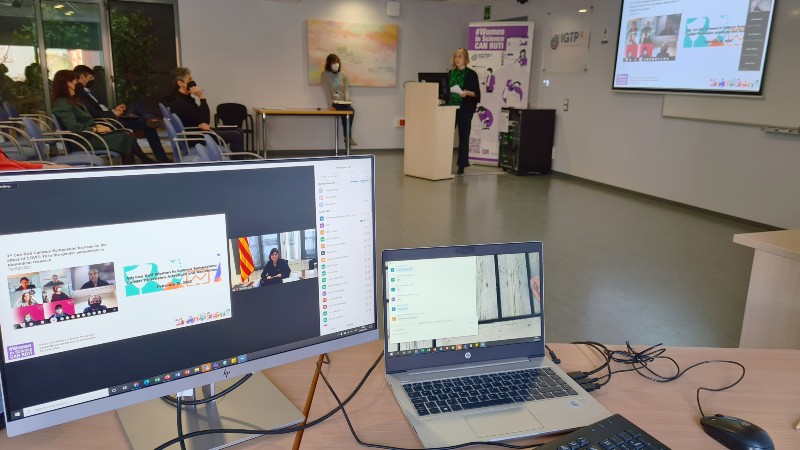
Their fourth symposium was held by the Can Ruti Women in Science Working Group on 10 February to celebrate the International Day of Women and Girls in Science (11 February) and once again the focus was put on data that illustrates inequalities. This edition, on Gender Dimension: advances and resistance, was held at the IGTP and attended by 147 people from institutions on and off the campus.
The General Director of the IGTP, Dr Jordi Barretina, welcomed everybody and reminded everyone that the IGTP is proud to be taking steps towards better equality through its Gender Equality Plan, Prevention of Harassment Protocol and zero tolerance of harassment of any kind.
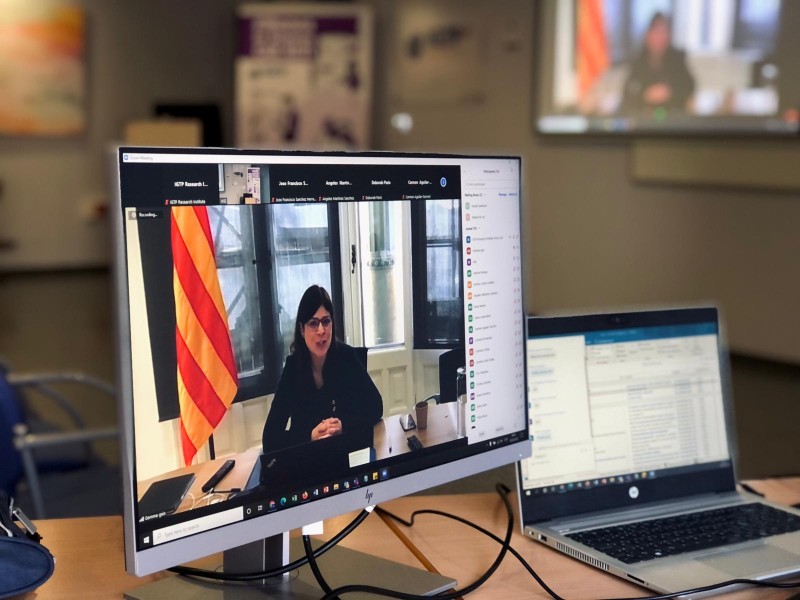
The Minister for Research and Universities, Gemma Geis opened the event with a strong affirmation of the government's commitment to gender equality, despite the enormous task still ahead. Only 21% of Information and communications technology graduates are women, 20% of professors are women and 21% of director level staff at CERCA centres are women. She encouraged women to lead the way in a process that must end with equal opportunities for everyone, whatever their gender, but also recognized that the government must work tirelessly to make it possible.
In the keynote speech, Lucy Ferguson, Yellow Window, partner in the Horizon 2020-funded SUPERA Project and renowned gender issues researcher and trainer gave an Introduction to the Resistances Toolkit developed by the SUPERA Project. Her talk gave the audience some ideas on how to recognize, classify and tackle the complex and constantly changing obstacle of resistance. The talk had three parts: categorizing and theorizing resistances; some guidelines for dealing with resistances and some pointers on building a resistances action plan. The toolkit provides useful ways to break down resistance in order to tackle it in a manageable way and provides information on how to track changing resistances over time. The toolkit is free to use and SUPERA received funding from the European Union's Horizon 2020 Programme.
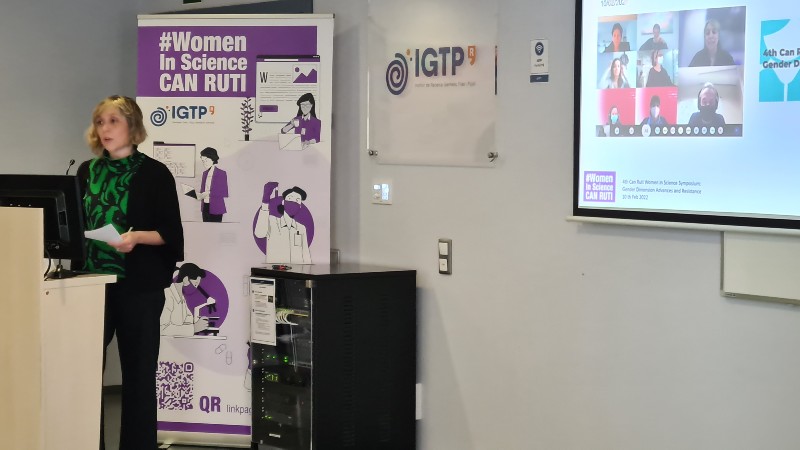
Julia García-Prado, Group Leader at IrsiCaixa and Scientific Director of the IGTP gave a report on the advances of the Gender Equality Committees on the campus. IrsiCaixa, AIDS Research Institute, the Fight AIDS Foundation and the IGTP are advancing in their Gender Equality Plans and associated activities and policies.
Reporting on the results of the WiS Observatory of gender balance in speakers, organizers and moderators of events organized from the Can Ruti Campus in 2021, Jose A. Muñoz-Moreno of the Fight AIDS Foundation congratulated the III Edition Inmunoterapia & Hemopatias and Aging in HIV conferences, both held in November. These conferences complied with European recommendations for participation. He also congratulated Hot Topics in HIV - Vaccines, Immune Recovery and Eradication; the WiS Symposiums and the organizers of the B·ARGO (Badalona Applied Research group in Oncology) events for consistent good performance regarding gender balance over the three years the observatory has taken place.
Nuria Izquierdo of IrsiCaixa, AIDS Research Institute presented the results of the 2020 questionnaire to Can Ruti Campus researchers and the analysis of the effects of the covid-19 pandemic on scientific production, scientific activities and mental health and wellbeing. This work concludes that female researchers have participated less in career development activities and more in altruistic activities along with experience greater stress associated with caring duties.The study suggests there are opportunities for institutional leaders and other stakeholders to accelerate the changes needed to reduce inequalities. The message is clear and hard-hitting, gender gap differences are at the core of our scientific community and reflect a historical status quo still not overcome. The work concludes with the need to reflect and implement solutions for all the problems identified in this survey.
Jordi Casabona, Director of the CEEISCAT (Centre for Epidemiological Studies of Sexually Transmitted Disease and AIDS in Catalonia) gave a masterful journal club on the 2021 paper in the Journal of Antimicrobial Chemotherapy entitled the Analysis of inappropriate prescribing in elderly patients of the Swiss HIV Cohort Study reveals gender inequity (Livio et al). The paper identified that inappropriate prescribing is prevalent and slightly more frequent amongst women. He finished the presentation with some local data from the PISCES study and the need for networking and standardization of quality data collection and including the gender dimension in all studies.
Jörg Müller, Senior Researcher at the IN3 (Internet Interdisciplinary Institute) of the Open University of Catalonia and leader of the Act On Gender Project funded by the Horizon 2020 Programme gave a talk called - Insights from the H2020 ACT project. He explained the benefits of communities of practice and also some of the pitfalls regarding adequate resources and the risk that work perceived as "care" fall once again on the women in an organization. The IGTP participated in the ACT LifeSciCop and this was instrumental in getting the IGTP Gender Equality Plan implemented.
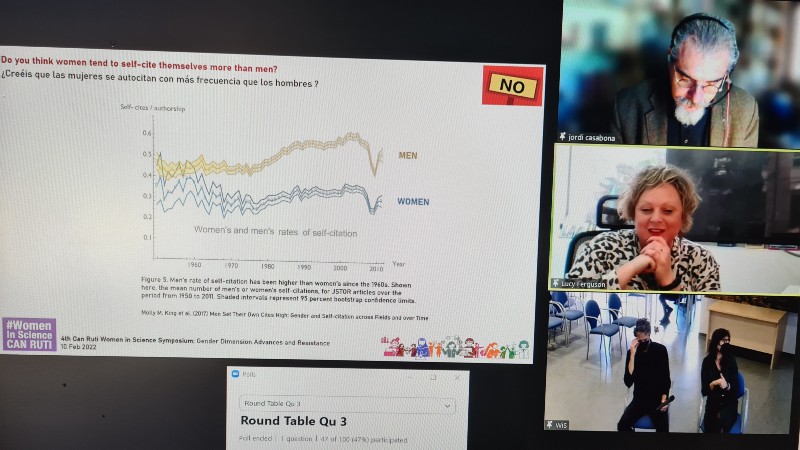
Finally, members of the WiS ran an interactive Round Table Session with Lucy Ferguson, Jordi Casabona and Jörg Müller, who were joined by Inés Velasco, Clinical Research Coordinator in Obstetrics and Gynaecology at Germans Trias i Pujol University Hospital. The online audience were able to agree or disagree with statements set by the team, who then provided data on the various questions posed and invited the panel to join in with a lively debate.
As always WiS closed the symposium with a homage to a woman whose scientific achievements have not been recognized by the traditional awards systems. This year Cristina Peligero outlined the career of Marguerite Vogt. Her work included Drosophila developmental genetics and along with Renato Dulbecco she developed the first plaque assays of poliovirus on a layer of monkey kidney cells. The two also went on to demonstrate how certain viruses integrate their genetic material into host DNA causing uncontrolled growth which also changed the way scientists thought about cancer. Dulbecco was awarded a Nobel prize in 1975, but he never acknowledged the importance of Vogt's work for his success. Vogt herself was never awarded a major prize.
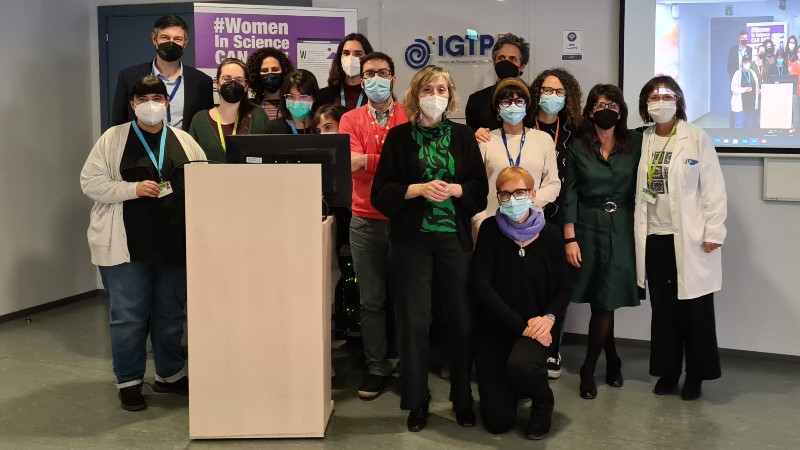
Can Ruti Women in Science (WiS) continues to work to alert the scientific community to innate inequalities and to help to provide solutions. The members of WiS are all volunteers and the IGTP provides support to the organization.

